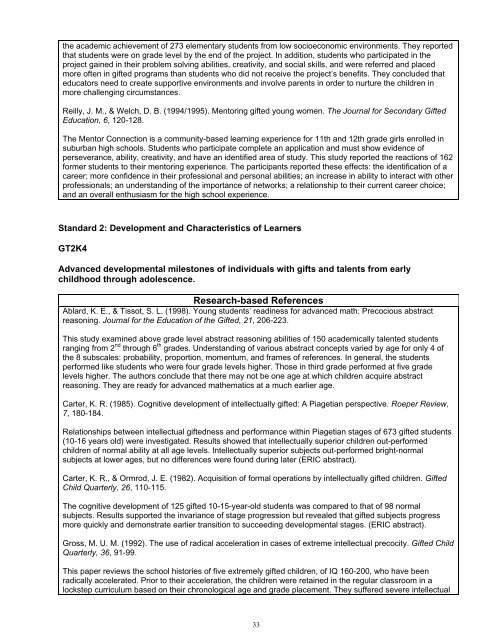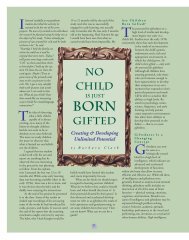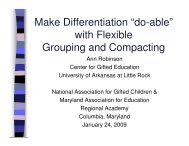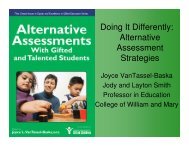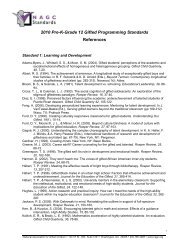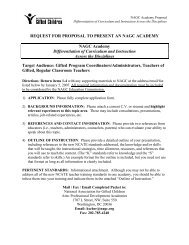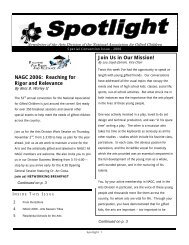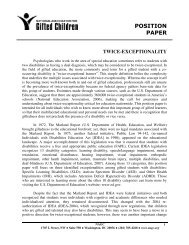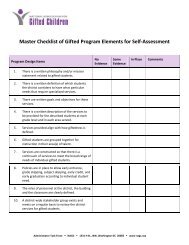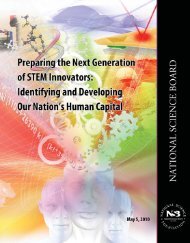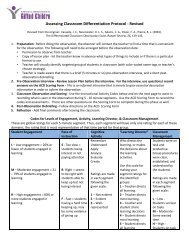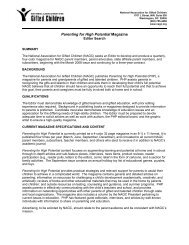Piirto reports no personality differences between genders, but choices made after college (a time whencommitment and regular effort in the field of creativity matters) account for the few creative women in the artsand math fields. Parental expectations about having children play a role. Women attempt to reconcile beingthe nurturing, recessive, female versus the unconventional creative artist and are more apt to see familyduties equally as important as their work. However, prominence in creative fields require early achievementand continued production. Later career productivity due to reproductive and family necessity may hindergenuine eminence in creative fields.Subotnik, R. F., & Olszewski-Kubilius, P. (1997). Restructuring special programs to reflect the distinctionsbetween children’s and adults’ experiences with giftedness, Peabody Journal of Education, 72 (3&4), 101-116.Using the eminence literature, the authors describe experiences that might be successful for channelingparticipants into promising career trajectories. The talent development activities include access to elite levelsof adult creators and performers, excellent teachers and mentors, long-term engagement in a specific talentfield, competitions, summer and extracurricular programs. Parents are important in modeling the habitsconducive to talent development, building supportive social support systems, and assisting children toacquire certain personality dispositions.Practice-based ReferencesBorland, J. H., Schnur, R., & Wright, L. (2000). Economically disadvantaged students in a school for theacademically gifted: A postpositivist inquiry into individual and family adjustment. Gifted Child Quarterly, 44,13-32.This follow-up study reports the effects of the placement in a school for gifted students of five economicallydisadvantaged minority students from central Harlem who were identified in kindergarten as potentiallyacademically gifted. The authors concluded that the students made better academic progress than couldhave been expected, were integrated socially, and appeared to be experiencing no adverse emotionalreaction. The authors believe that their success was dependent upon the students, the families, and theschool setting. They also assert that the identification of economically disadvantaged students as potentiallygifted is valid.Hébert, T. P., & Neumeister, K. L. S. (2000). University mentors in the elementary classroom: Supporting theintellectual, motivational, and emotional needs of high-ability students. Journal for the Education of the Gifted,24, 122-148.Case study and ethnographic research methods were used to examine how a fourth-grade teacherimplemented a mentoring program and its effect on the students. The teacher was able to create 18successful partnerships between her students and university mentors. The program design includedpreplanning, instructional strategies and flexibility. The teacher also implemented curriculum compacting sothat the high ability students would have time to work with their mentors. The program met the goal ofmeeting differentiated needs of the students and created opportunities for new relationships between theuniversity mentors and the teachers’ students.Melber, L. M. (2003). Partnerships in science learning: Museum outreach and elementary gifted education.Gifted Child Quarterly, 47, 251-258.This study examined a museum program and its effects on high achieving fourth and fifth graders. Themuseum program consisted of eight school-based sessions, held twice weekly, that allowed students toparticipate in activities that were similar to the scientific processes employed by museum scientists andincorporated actual museum specimens and artifacts. The ninth session occurred in the museum wherestudents met the scientists and visited areas normally closed to the public. Pre- and post questionnairesindicated that students were more interested in being a scientist, had less stereotyped ideas about ascientist’s work, and gained content knowledge.Moon, T. R., & Callahan, C. M. (2001). Curricular modifications, family outreach, and a mentoring program.Journal for the Education of the Gifted, 24, 305-321.The researchers studied the interventions of mentoring, parental involvement, and multicultural curricula on32
the academic achievement of 273 elementary students from low socioeconomic environments. They reportedthat students were on grade level by the end of the project. In addition, students who participated in theproject gained in their problem solving abilities, creativity, and social skills, and were referred and placedmore often in gifted programs than students who did not receive the project’s benefits. They concluded thateducators need to create supportive environments and involve parents in order to nurture the children inmore challenging circumstances.Reilly, J. M., & Welch, D. B. (1994/1995). Mentoring gifted young women. The Journal for Secondary GiftedEducation, 6, 120-128.The Mentor Connection is a community-based learning experience for 11th and 12th grade girls enrolled insuburban high schools. Students who participate complete an application and must show evidence ofperseverance, ability, creativity, and have an identified area of study. This study reported the reactions of 162former students to their mentoring experience. The participants reported these effects: the identification of acareer; more confidence in their professional and personal abilities; an increase in ability to interact with otherprofessionals; an understanding of the importance of networks; a relationship to their current career choice;and an overall enthusiasm for the high school experience.Standard 2: Development and Characteristics of LearnersGT2K4Advanced developmental milestones of individuals with gifts and talents from earlychildhood through adolescence.<strong>Research</strong>-based ReferencesAblard, K. E., & Tissot, S. L. (1998). Young students’ readiness for advanced math: Precocious abstractreasoning. Journal for the Education of the Gifted, 21, 206-223.This study examined above grade level abstract reasoning abilities of 150 academically talented studentsranging from 2 nd through 6 th grades. Understanding of various abstract concepts varied by age for only 4 ofthe 8 subscales: probability, proportion, momentum, and frames of references. In general, the studentsperformed like students who were four grade levels higher. Those in third grade performed at five gradelevels higher. The authors conclude that there may not be one age at which children acquire abstractreasoning. They are ready for advanced mathematics at a much earlier age.Carter, K. R. (1985). Cognitive development of intellectually gifted: A Piagetian perspective. Roeper Review,7, 180-184.Relationships between intellectual giftedness and performance within Piagetian stages of 673 gifted students(10-16 years old) were investigated. Results showed that intellectually superior children out-performedchildren of normal ability at all age levels. Intellectually superior subjects out-performed bright-normalsubjects at lower ages, but no differences were found during later (ERIC abstract).Carter, K. R., & Ormrod, J. E. (1982). Acquisition of formal operations by intellectually gifted children. GiftedChild Quarterly, 26, 110-115.The cognitive development of 125 gifted 10-15-year-old students was compared to that of 98 normalsubjects. Results supported the invariance of stage progression but revealed that gifted subjects progressmore quickly and demonstrate earlier transition to succeeding developmental stages. (ERIC abstract).Gross, M. U. M. (1992). The use of radical acceleration in cases of extreme intellectual precocity. Gifted ChildQuarterly, 36, 91-99.This paper reviews the school histories of five extremely gifted children, of IQ 160-200, who have beenradically accelerated. Prior to their acceleration, the children were retained in the regular classroom in alockstep curriculum based on their chronological age and grade placement. They suffered severe intellectual33
- Page 3 and 4: This book provides a survey of fede
- Page 5 and 6: Castellano, J. A. (1998). Identifyi
- Page 7 and 8: U.S. Department of Education. (1993
- Page 9 and 10: This qualitative investigation expl
- Page 11 and 12: four as “unsuccessful.” A child
- Page 13 and 14: from a comparison school district.
- Page 15 and 16: Cross and Coleman, Feldhusen, Gagn
- Page 17 and 18: Books, and Talents Unlimited. Teach
- Page 19 and 20: Kitano, M. K. (2003). What’s miss
- Page 21 and 22: Russo, C. J., & Ford, D. Y. (1993).
- Page 23 and 24: CEC Knowledge/Skills Evidence-BaseR
- Page 25 and 26: Piechowski, M. M. (1992). Giftednes
- Page 27 and 28: 14-18 in a competitive gifted progr
- Page 29 and 30: Many students of color are not perf
- Page 31: Bloom, B. S., & Sosniak, L. A. (198
- Page 35 and 36: Silverman, L. K. (1997). The constr
- Page 37 and 38: Milbrath, C. (1998). Patterns of ar
- Page 39 and 40: differentiated instruction, student
- Page 41 and 42: condition. (adapted from the journa
- Page 43 and 44: Practice-based ReferencesCline, S.
- Page 45 and 46: Literature/Theory-based ReferencesB
- Page 47 and 48: This book focuses on ways teacher c
- Page 49 and 50: students; and compared the learning
- Page 51 and 52: Standard 3: Individual Learning Dif
- Page 53 and 54: This edited volume delineates couns
- Page 55 and 56: Literature/Theory-based ReferencesA
- Page 57 and 58: schools (one affluent community, on
- Page 59 and 60: Gagné’s Differentiated Model of
- Page 61 and 62: considerations in planning a sound
- Page 63 and 64: Stamps, L. (2004). The effectivenes
- Page 65 and 66: and menus.Standard 4: Instructional
- Page 67 and 68: determining the central purpose or
- Page 69 and 70: Swiatek, M. A. (1993). A decade of
- Page 71 and 72: applications and theoretical modeli
- Page 73 and 74: curricular dimensions that are resp
- Page 75 and 76: Standard 4: Instructional Strategie
- Page 77 and 78: CEC Knowledge/Skills Evidence-BaseR
- Page 79 and 80: Perry, T., Steele, C. & Hilliard, A
- Page 81 and 82: competence and superior adjustment
- Page 83 and 84:
challenging and provocative arena.
- Page 85 and 86:
the influence of verbal skills on p
- Page 87 and 88:
perceived as positive. (ERIC abstra
- Page 89 and 90:
Christophersen, E., & Mortweet, S.
- Page 91 and 92:
Standard 5: Learning Environments a
- Page 93 and 94:
practical advice for all classroom
- Page 95 and 96:
Kerr, B., & Cohn, S. (2001). Smart
- Page 97 and 98:
CEC Knowledge/Skills Evidence-BaseR
- Page 99 and 100:
Standard 6: Language and Communicat
- Page 101 and 102:
Practice-based ReferencesGavin, M.
- Page 103 and 104:
This article focuses on recommended
- Page 105 and 106:
This study was designed to measure
- Page 107 and 108:
Standard 6: Language and Communicat
- Page 109 and 110:
The authors conclude that more targ
- Page 111 and 112:
Standard 6: Language and Communicat
- Page 113 and 114:
Standard 7: Instructional PlanningG
- Page 115 and 116:
The four parallel approaches to cur
- Page 117 and 118:
suggested curriculum or supplementa
- Page 119 and 120:
Part of the Gifted Treasury Series,
- Page 121 and 122:
Prufrock Press.This teacher-friendl
- Page 123 and 124:
introductory chapter, individual ch
- Page 125 and 126:
all individuals and it improves sel
- Page 127 and 128:
Both of these books outline how to
- Page 129 and 130:
Standard 8: AssessmentGifts and Tal
- Page 131 and 132:
Thousand Oaks, CA: Corwin Press.The
- Page 133 and 134:
contribution of dynamic assessment
- Page 135 and 136:
School District's advocacy efforts.
- Page 137 and 138:
students not using the unit.Literat
- Page 139 and 140:
identification of more economically
- Page 141 and 142:
Standard 8: AssessmentGT8S2Use tech
- Page 143 and 144:
eviews the literature related to pr
- Page 145 and 146:
Practice-based ReferencesCallahan,
- Page 147 and 148:
CEC Knowledge/Skills Evidence-BaseR
- Page 149 and 150:
Standard 9: Professional and Ethica
- Page 151 and 152:
Standard 9: Professional and Ethica
- Page 153 and 154:
excellence and equity in education.
- Page 155 and 156:
culturally diverse students. Journa
- Page 157 and 158:
Standard 9: Professional and Ethica
- Page 159 and 160:
elated to giftedness and the prepar
- Page 161 and 162:
Americans (n=580). Approximately 50
- Page 163 and 164:
Standard 10: CollaborationGifts and
- Page 165 and 166:
Sixty-three Latina women (43 doctor
- Page 167 and 168:
Standard 10: CollaborationGT10S1Res
- Page 169 and 170:
associations, burnout, and resource
- Page 171 and 172:
activities with insects and arthrop
- Page 173 and 174:
“kids can make a difference!”St
- Page 175 and 176:
Rash, P. K. (1998). Meeting parents
- Page 177 and 178:
Standard 10: CollaborationGT10S4Col
- Page 179 and 180:
the interface with general educatio
- Page 181 and 182:
for gifted Hispanic LEP students an
- Page 183 and 184:
student portfolios, the Torrance Te
- Page 185:
Parker, J. (1996). NAGC standards f


